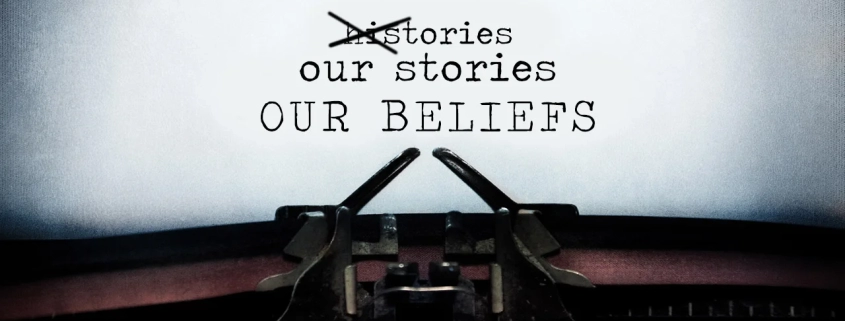Reflecting on priorities in our vision of reality
In the Cedar Crossings, I wrote about how we have stories before beliefs. Then, in my sermon on September 18, I shared about how we are lost before we are sinners. After that service someone asked if the sermons were printed so she could remember what precedes what. So here they are:
Story precedes Belief: Since I already wrote about this last week I won’t repeat myself – only to remind that people’s beliefs connect to the lives they have lived, and if we want to understand why they believe the way they do it is imperative to learn more about the stories of their lives.
Lost-ness precedes Sinfulness: This also is repetitive since I was preaching about it. The focus in the theology of most Protestant churches is that we are saved from our sin – Jesus died for our sins – and this is understood as moral failure. I believe that there are many ways that God in Christ can transform us – healing our waywardness is one of those ways, but it isn’t the only way. Long ago I read a book by Paul Tillich entitled The Courage to Be about the various kinds of anxiety we experience. One of those is the anxiety of condemnation – this is the need to be reconciled with God because of sin. There are other anxieties: death, isolation, meaninglessness. The idea is that we all feel separated from in different ways, expressed in different anxieties. The anxiety of isolation is, for example, a common one in today’s world. Many young people, particularly boys feel that they are all alone – that God doesn’t love them. They don’t necessarily feel that they’ve done anything wrong and to tell hem that Jesus died for their sins would not be helpful. They need to know that they are loved and can be connected – they need community. Each of these anxieties represents a way of being lost. Being a sinner is one way to be lost but lost-ness precedes sinfulness.
Theology precedes Morality: This comes from one of my Old Testament professors, James Sanders. It means that when we read the Bible we need to ask first, what is this saying about God before we try to extract any moral message. Those who wrote the Bible for mostly trying to say something about God; any moral meaning is secondary and must be read in the context of what is said about God. This is a refutation of the belief that the Bible is a playbook for life. Too often we emphasize moral precedence over the overall character of God. And too often that can lead to judgment of others.
Biology/Ecology precedes Economy: I didn’t mention this one on Sunday, but it bears mentioning. It is a reminder that when God created the first thing created was the economy. The biology, geology, ecology of the creation is more basic to reality that economics. Yet, our lives and our politics are consumed by economic issues. And often these issues stand in conflict with the needs of the earth. I can easily see an Old Testament prophet telling us that to choose economic growth at the expense of the environment is folly. To frame it in the context of our current adult study, it would be to choose one’s own needs rather than the common good. And just as eventually the people of Israel paid for their folly, so will we if we do not understand that ecology is more fundamental than the economy.
Justice precedes Peace: There was at the time of Jesus something called Pax Romana – the Peace of Rome. It was the peace that Roman hegemony brought to the world. There were no more wars, aside from Rome continuing its conquest of Germania and elsewhere. But the Peace of Rome was bought at a price – domination. Sure, there were fewer wars but not less violence – it came in the form of persecution. Jesus was a victim of that persecution; Jesus was a martyr to the Peace of Rome. Any real peace must be preceded by justice for all people. Any nation or corporate entity in the world that has real power must keep this in mind – and we must keep it in mind when we vote. Does this person have the vision of Justice for all – or some variation of Pax Romana?
Generally this has to do with how we see the world – what is more important, more fundamental? We need to reflect on our priorities, not only personal priorities but priorities in our vision of reality. See you in worship.
P.Jim



